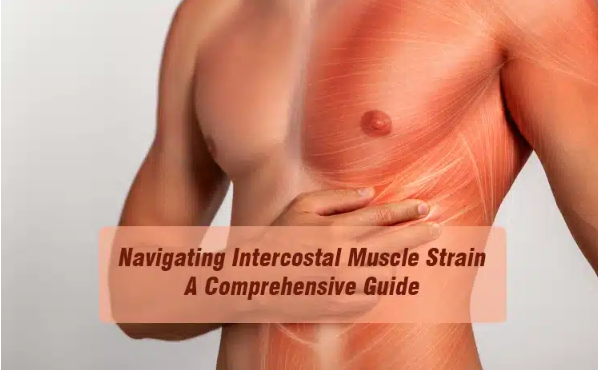
Introduction
Intercostal muscle strain happens when the muscles between your ribs get stretched or torn. These muscles help you breathe and keep your upper body stable. When they’re strained, you can experience a lot of pain and difficulty with everyday activities. In this article, we’ll explain what causes intercostal muscle strain, how to recognize it, and how to treat and prevent it.
What is Intercostal Muscle Strain?
Definition
An intercostal muscle strain occurs when the muscles between your ribs are overstretched or torn. These muscles are essential for breathing and support your ribcage. Knowing how these muscles work helps us understand how they can get injured.
Anatomy of Intercostal Muscles
The intercostal muscles are found between each rib in your chest. There are three layers:
- External Intercostal Muscles: These help lift the ribs when you breathe in.
- Internal Intercostal Muscles: These help pull the ribs down when you breathe out.
- Innermost Intercostal Muscles: These are the deepest layer and assist with rib movement.
Causes of Intercostal Muscle Strain
Physical Activities
One of the most common reasons for an intercostal muscle strain is physical activity. Activities like lifting heavy objects, playing sports, or sudden movements can strain these muscles. For example, lifting weights or playing basketball can cause a strain.
Trauma or Injury
Direct hits or falls on your ribcage can also cause a muscle strain. This often happens in contact sports or from accidents.
Repetitive Stress
Doing the same actions repeatedly, such as twisting or bending a lot, can stress the intercostal muscles. Jobs or hobbies that involve frequent lifting or bending might lead to a strain.
Poor Posture
Sitting or standing in a hunched position for a long time can strain these muscles. Bad posture can lead to muscle fatigue and discomfort.
Symptoms of Intercostal Muscle Strain
Pain
Pain is the main symptom of an intercostal muscle strain. It usually feels sharp and is located between the ribs. It can get worse with movement, deep breathing, or coughing.
Tenderness
The area might be tender when you touch it. Pressing on the ribs or nearby muscles can cause pain.
Muscle Spasms
You might experience muscle spasms or cramps in the area, which can add to the discomfort.
Breathing Difficulties
In more severe cases, the pain might make it hard to take deep breaths. You might end up breathing more shallowly because of the pain.
How to Diagnose Intercostal Muscle Strain
Medical History and Physical Exam
A doctor will first ask about your medical history and examine you. They will check the location of the pain and see if the area is tender or if you have muscle spasms.
Imaging Tests
Sometimes, your doctor might suggest X-rays or MRI scans to make sure there’s no other issue, like a broken rib or other medical condition.
Treatment for Intercostal Muscle Strain
Rest
Rest is crucial for healing. Avoid doing things that make the pain worse and give your muscles time to recover.
Ice and Heat Therapy
Apply ice to the strained area to reduce swelling and numb the pain. After a few days, use heat to relax the muscles and improve blood flow.
Pain Relief Medications
Over-the-counter medicines like ibuprofen or acetaminophen can help with pain and swelling. Follow the instructions and ask your doctor if you have any questions.
Physical Therapy
In some cases, physical therapy might be suggested. A physical therapist can show you exercises to strengthen the muscles and help them heal.
Breathing Exercises
Doing deep breathing exercises can help ease the pain and improve how well you breathe. It also helps you avoid shallow breathing due to pain.
How to Prevent Intercostal Muscle Strain
Proper Techniques
Using the right techniques when you lift or exercise can help prevent muscle strain. For instance, lift with your legs, not your back, and keep good posture.
Regular Exercise
Exercise regularly to strengthen your core and upper body muscles. This helps support the intercostal muscles and reduces the risk of strain.
Stretching
Stretching regularly can improve flexibility and reduce muscle stiffness. Focus on stretches that target the area around your ribcage.
Ergonomic Adjustments
Adjusting your workspace and daily activities to maintain good posture can prevent muscle strain. For example, adjust your chair and desk height to support better posture.
When to See a Doctor
Most intercostal muscle strains can be treated at home, but you should see a doctor if:
- The pain is severe or getting worse.
- You have trouble breathing or feel chest pain.
- There’s no improvement with home treatment.
- You think you might have a more serious injury or condition.
FAQs
How long does it take to recover from an intercostal muscle strain?
Recovery time depends on how severe the strain is. Mild strains may heal in a few weeks, while more severe strains might take several months.
Can I keep exercising with an intercostal muscle strain?
It’s best to rest and avoid activities that make the pain worse. Talk to your doctor or a physical therapist before starting any new exercises.
How can I tell if I have an intercostal muscle strain or a rib fracture?
Both can cause rib pain, but rib fractures usually come with more intense pain, difficulty breathing, and possible bruising. Imaging tests can help determine the cause.
Are there long-term effects of an intercostal muscle strain?
Most people recover completely from an intercostal muscle strain. However, repeated strains or improper healing might lead to ongoing discomfort. Proper treatment and prevention are important.
Conclusion
Intercostal muscle strain is a common injury that can disrupt daily life. Understanding the causes, symptoms, and treatment options can help you manage and recover from this condition effectively. By using proper techniques, exercising regularly, and maintaining good posture, you can prevent future strains. If you experience severe pain or have concerns about your injury, seek medical advice for proper care and recovery.
For More Blogs Please visit: emperiortech.











